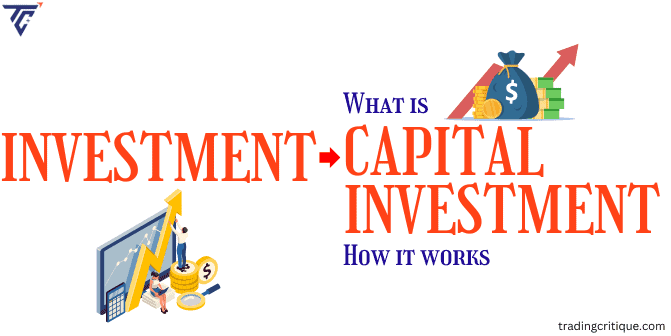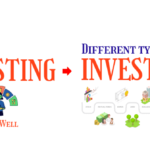What is capital? In economics, capital refers to the basic land, material, machinery, money, etc. used to start a business or create an economic creation. Which money you use to start a business or put in the bank so you can earn more money (interest). It is also known as capital.
Apart from this let us see what is capital investment, how it works, and how capital gain works in detail.
What are capital investments?
What is a capital investment? Capital investment means spending money to promote a company’s long-term expansion. In Business, a company plans and executes capital investments to ensure future growth.
Increased operational effectiveness, more market share, and greater revenue are the typical goals of capital investments. The money for capital investment can originate from several places, although big capital projects are frequently funded by taking out loans or offering stock.
Methods of obtaining capital:
The funds required to operate a business can be generated internally from business activities or obtained externally through borrowing or selling ownership stocks. Some typical ways companies access capital are:
- Personal savings
- Friends and relatives
- Venture capitalists (VC)
- Corporations
- State or local governments
- Private credits
- Work or business performance
- Going with an IPO
Why capital investment is important?
- It is important for those interested in accumulating money and spending it in the right way.
- It is important to the person who is raising the long-term investment.
- To increase productiveness and economy.
- It creates employment opportunities for the society.
- To produce a better degree of output.
- Generate revenue and profit to long time.
What is invested capital?
Investment capital is the money that a company’s debtholders and shareholders invest in it. A business that wants to grow can raise money by issuing bonds or selling shares of stock. Shareholders are those who buy shares in a company and debt holders are those who buy bonds.
Benefits of invested capital
Benefits for a company
- It is a fund that helps a company expand and acquire new opportunities.
- It involves two processes in an organization. One is the purchase of fixed assets such as land, buildings, and equipment. Second is daily expenses such as paying for goods and paying the white man’s salary.
- A company may choose invested capital funding source to obtain a loan from a bank for a few reasons.
Benefits for an investor
- The return on invested capital ratio measure is used to evaluate an investor’s invested capital. It enables in figuring out the cost of the company.
- It could use the invested funds to generate higher profits as compared to other companies.
- It reveals the efficiency of the invested company.
Invested capital calculation
The calculation of invested capital is divided into two types of approaches. These are the operating and financing approach.
Operating approach formula
Invested capital = Net working capital + PP&E + Goodwill and intangibles.
- Net working capital means current operating assets are the sum of non-interest-bearing current liabilities.
- PP&E is including the long-term assets value of Property, Plant, and Equipment.
- Intangibles and goodwill include things like computer software, copyrights, and brand recognition.
Financing approach formula
Invested capital = Total debt & leased + Total equity & equity equivalents + non-operating budget & Investment.
How does capital investment work?
The act of investing money in long-term assets to provide future advantages, such as more income, lower expenses, or enhanced productivity, is known as capital investment. It may entail purchasing new machinery, constructing a new setting, or obtaining an alternate business.
The plan is to invest a lot of money upfront in the hopes of earning larger returns later. Proper analysis of predicted cash flows, risks, and returns is usually the basis for capital investment decisions.
Managers of a company may invest capital in the business. They purchase long-term assets, like equipment, to support the company’s quicker growth or more efficient operations. Physical assets are considered capital in this context.
A business may get funding from a person, a venture capital firm, or a financial institution. When a new company goes public, it receives a large amount of capital investment from multiple investors. An established business can borrow money from a bank or invest capital using its cash reserves. To raise money for capital investments, it could issue bonds or equity shares.
How does capital gains work on investment property?
When an asset increases in value and is subsequently sold, the positive difference between the sale price and the original purchase price is called a capital gain. Capital gains can occur with any kind of asset, whether an investment or something bought for personal use. The capital gain may be categorized as short-term or long-term. Capital profits ought to be claimed on earnings tax returns.
Calculation of capital gain
Value of Capital Gain = (Full Value of Consideration Received on Transfer) – (Cost of Acquisition of Capital Asset + Maintenance cost of Capital Asset + Capital Expenditure Incurred in Connection with Transfer of Capital Asset).
How does capital gains tax work on investment property?
The investor’s profit on the sale of the investment is subject to taxes known as capital gains tax. When the funding is sold, it must be paid for that tax year. Capital gains taxes apply only to digital assets such as stocks, bonds, cryptocurrencies, and NFTs, as capital assets such as jewelry, coin collections, and real estate.
Tax rate of capital gain
Should you decide to sell your house or real estate within a year of acquiring it, the short-term capital gains will be subjected to taxation as regular income, with a maximum rate of 37 percent.
On the other hand, if you have owned the property for more than a year, any long-term capital gains will be subject to a tax rate of either 0%, 15%, or 20%, depending on your income tax category.
| Tax Rate | Single | Married & filing separately | Head of household | Married & filling jointly |
|---|---|---|---|---|
| 0% | Up to $47,025 | Up to $47,025 | Up to $63,000 | Up to $94,050 |
| 15% | $47,026 to 518,900 | $47,026 to 291,850 | $63,001 to 551,350 | $94,051 to 583,750 |
| 20% | $ 518,901 & more | $ 291,851 & more | $ 551,351 & more | $ 583,751 & more |
Conclusion
Capital investment refers to spending money on assets that will be utilized over an extended period. The decision to make capital investments should be made prudently since they necessitate substantial funds.
This fund in a checking or savings bank account and capital budget area. There are numerous ways to obtain the required financing, including using the company’s capital such as equity or debt, taking out a loan from financial institutions, and so on.
It’s an important choice that can have a big impact on a company’s long-term profitability and success. We strongly believe that this will help in a thorough analysis of capital project budgeting, risks, and returns to identify the greatest investment opportunities.
Pro Tip
We hope you are fully aware of capital investment. Similarly, there are some other investment platforms to invest your money. Some of them are stocks, bonds, debentures, cryptocurrencies, and forex. Visit our trusted forex broker website to know everything about these investments.
FAQ – Frequently Asked Questions
1. What are the advantages of capital investment?
Capital investment is beneficial for the growth and success of all businesses. It enables companies to improve results, better efficiency, and maintain their position as market leaders.
- Increases the productivity of traders.
- Improves and expands business performance.
- Creates competitiveness withinside the market.
- Promotes new merchandise and services.
- Generates employment and contributes to the general monetary growth of the country.
2. What is a capital investment plan?
The capital investment plan (CIP), which allocates state, federal, and other revenues to finance long-term system upgrades, provides funding for transportation projects. Planned investments for the next five years are provided in this yearly update plan.
It is the operating budget of resources where an optimistic expenditure curve is defined, planned, socialized, and approved by operations, stockholders, and finance.
3. How do I avoid capital gains tax on my property?
There are lawful ways to avoid capital gains tax when selling a property. You can avoid capital gains tax on the sale of your property if you buy another property and utilize the 121-home sale exclusion. Moreover, the 1031-like-kind exchange enables investors to put off taxes when they reinvest the money from the sale of an investment property into a new investment property.




